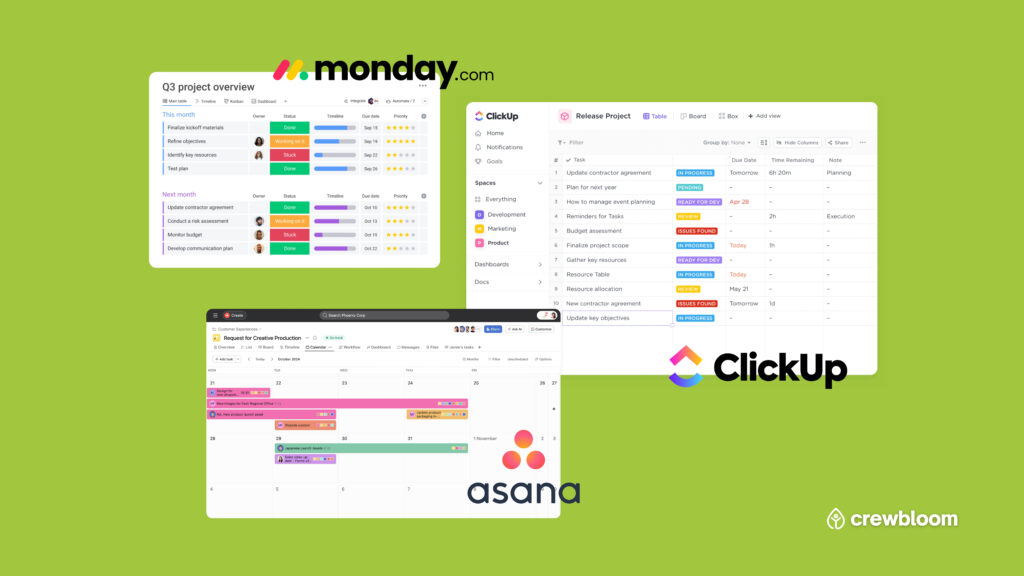Building a team used to mean being limited to the talent within driving distance of your office. Today, that’s no longer the case. Businesses of every size are discovering that the best person for the job might be thousands of miles away…and that’s where offshore remote staffing comes in.
Whether you’re a startup trying to stretch your budget, a growing company that needs to scale quickly, or an enterprise looking for specialized skills, hiring offshore talent can be a game-changer. However, with so many terms (offshore, nearshore, outsourcing, and more), it can feel overwhelming to know where to start.
This CrewBloom guide breaks it all down for you. From understanding the basics to managing legal requirements, costs, and cultural differences, you’ll learn exactly how offshore remote staffing works, when it makes sense, and how to do it right.
What is Offshore Remote Staffing?
Offshore remote staffing means hiring talent from another country to work for your company, without needing to set up an office there. Unlike outsourcing, where you hand over projects to an external agency, offshore staffing lets you build your own remote team that works directly with you.
Think of it this way: instead of being limited to the talent pool in your city or even your country, you suddenly open your doors to the world.
Some key things to know about offshore remote staffing:
- Your team members are based in another country (often with lower labor costs).
- You still manage them day-to-day, just like you would with local employees.
- A staffing partner (like CrewBloom) can handle recruitment, compliance, and contracts so you can focus on growth.
In short: offshore staffing = global hiring power, without the headaches of international HR paperwork.
Offshore vs. Nearshore vs. Onshore vs. In-house
If you’ve ever gotten lost in the words (offshore, nearshore, onshore, in-house), you’re not alone. Here’s a simple way to think about it:
Model | Where Talent Comes From | Pros | Cons |
Offshore | Countries far from your HQ (e.g., US → Philippines, India, South Africa) | Big cost savings, huge talent pool, 24/7 coverage | Time zone gaps, cultural adjustments |
Nearshore | Neighboring countries or similar time zones (e.g., US → Mexico, Colombia) | Easier communication, smaller cultural gap | Costs higher than offshore, limited talent pool compared to Asia |
Onshore | Same country, but via a staffing provider | Familiar culture, easy collaboration | Costs remain high, limited scalability |
In-house | Directly hiring employees in your HQ country | Full control, direct company culture alignment | Highest costs, slower hiring, limited reach |
The takeaway: offshore staffing offers the biggest cost advantage and access to global talent, while nearshore/onshore can be a good middle ground if you want easier overlap in working hours.
ALT: Cost comparison onshore vs offshore staffing
When Offshore Remote Staffing Makes Sense
Offshore staffing is about unlocking opportunities you couldn’t easily reach otherwise. Here are the situations where it makes the most sense:
- You need to scale quickly. Startups and growing businesses can’t always wait months to fill roles locally. Offshore staffing can put qualified people on your team in weeks.
- Your local talent pool is tapped out. Struggling to find affordable developers, sales reps, or customer support staff in your city? Offshore staffing expands your search to millions of candidates.
- You want round-the-clock coverage. Different time zones = natural 24/7 operations. Perfect for customer service, IT support, and global sales.
- You’re balancing growth with budget. Offshore teams allow you to stretch every dollar while still getting high-quality work done.
- You need specialized skills. Sometimes niche expertise is hard to source locally, but much easier (and more affordable) to find offshore.
At the end of the day, offshore staffing is a smart move when you want speed, savings, and access to talent, without sacrificing control over your team.
Key Benefits of Offshore Remote Staffing
Hiring offshore isn’t just about saving money (though that’s definitely a big plus). It’s about giving your business the flexibility, reach, and talent edge it needs to compete in a global market. Here are the biggest benefits you can expect:
1. Cost savings
Let’s be honest: budgets matter. Offshore staffing often lets you cut payroll expenses by 50-70% compared to local hires. That means more breathing room for things like marketing, product development, or scaling your operations. And because you’re working directly with your offshore team, you still get quality work without the bloated agency markup.
2. Access to global talent
Why limit yourself to the talent within a 20-mile radius? Offshore staffing lets you tap into millions of professionals around the world. From seasoned developers in India to top sales reps in Latin America to world-class customer service in the Philippines, you’ll find the skills you need, often faster than you could locally.
ALT: Team communication across time zones
3. Scalability and flexibility
Need 10 agents for peak season, but only 3 after? No problem. Offshore staffing makes it easy to scale teams up or down depending on your workload. This flexibility keeps your operations lean without forcing you into long-term commitments you might not be ready for.
4. Diverse & fresh perspectives
One of the underrated perks of building a global team is the range of perspectives they bring. Different cultural and professional backgrounds often lead to more creative problem-solving and fresh ideas that an all-local team might miss. Plus, diversity has been proven to boost innovation and team performance.
5. Around-the-clock operations
If your customers are worldwide, your team can be too. Offshore staffing allows you to cover multiple time zones, meaning someone is always online to answer calls, handle tickets, or close deals. For industries like SaaS, e-commerce, and real estate, this 24/7 availability is a game-changer.
6. Focus on core priorities
Instead of your local team getting bogged down in repetitive or back-office tasks, offshore staff can take those off their plate. This frees up your in-house team to focus on strategy, innovation, and growth.
Main Risks & Challenges of Offshore Remote Staffing
Like any business strategy, offshore remote staffing comes with its share of challenges. The important thing to remember is that most of these can be managed with the right preparation and partner. Some of the most common risks include:
- Communication barriers, such as time zone gaps, language differences, and cultural differences, can slow collaboration.
- Legal and compliance issues around contracts, worker classification, and taxes can feel overwhelming if you’re navigating them alone.
- Cultural misalignment that may lead to misunderstandings about workplace expectations or processes.
- Data security and IP protection concerns arise if your offshore team is handling sensitive information.
- Team cohesion struggles since building culture across borders requires more intentional effort.
These risks are real, but they aren’t deal-breakers. With clear processes, secure systems, and the right offshore staffing partner, they quickly become manageable.
How to Hire Offshore Remote Staff
Hiring offshore remote staff is a lot easier when you follow a clear process. Here’s a step-by-step guide to doing it right:
1. Define the role
Start by outlining exactly what you need: skills, level of experience, responsibilities, and whether the role will be full-time, part-time, or project-based. The more specific you are, the faster you’ll find the right fit.
2. Select a trusted staffing partner
Instead of trying to navigate international hiring alone, work with a staffing partner who specializes in offshore remote staffing. A good partner will pre-vet candidates, handle compliance, and speed up the process.
3. Screen and interview candidates
Once you have a shortlist, conduct interviews to assess both technical ability and cultural fit. Look for strong communication skills and adaptability since these matter just as much as expertise in a remote setup.
4. Agree on terms and contracts
Put everything in writing: compensation, working hours, KPIs, data security requirements, and NDAs. Clear agreements prevent misunderstandings down the line.
5. Onboard effectively
Treat offshore hires like new members of your core team. Provide training, access to tools, and a proper introduction to your company culture and values. The first few weeks set the tone for long-term success.
6. Establish clear communication routines
Decide upfront how you’ll stay connected. Daily stand-ups? Weekly check-ins? Use tools like Slack, Zoom, or Asana to keep collaboration smooth and transparent.

7. Track performance and track feedback
Offshore staff should have clear KPIs, just like in-house employees. Regular performance reviews and constructive feedback keep them aligned and motivated.
8. Invest in retention
Don’t think of offshore hires as “temporary help.” Celebrate their wins, include them in team activities, and create opportunities for growth. Happy offshore staff stay longer and perform better.
In Closing
Offshore remote staffing is a smarter way to grow your business with speed, flexibility, and access to world-class talent. With the right approach, you can overcome the common challenges and build a high-performing team that feels like a natural extension of your own.
Ready to explore what offshore staffing can do for you? Book a discovery call with CrewBloom today and start building your global dream team.
FAQs
What does offshore remote staffing mean?
Offshore remote staffing is the practice of hiring talent from another country to work directly with your business. Unlike outsourcing, you manage your offshore staff as part of your team, while a staffing partner may handle recruitment and compliance.
How is offshore staffing different from outsourcing?
Outsourcing typically involves delegating tasks to a third-party agency that manages the work on your behalf. Offshore staffing, on the other hand, gives you direct control over the staff, ensuring they align with your processes, culture, and goals.
What types of roles can be hired offshore?
Almost any role that can be done remotely can be staffed offshore. Common examples include customer support, sales, virtual assistants, software developers, data entry specialists, and back-office teams.
How much money can I save with offshore staffing?
Businesses often save 50–70% on labor costs compared to local hires. The exact savings depend on the role, location, and whether you hire directly or through a staffing partner.






